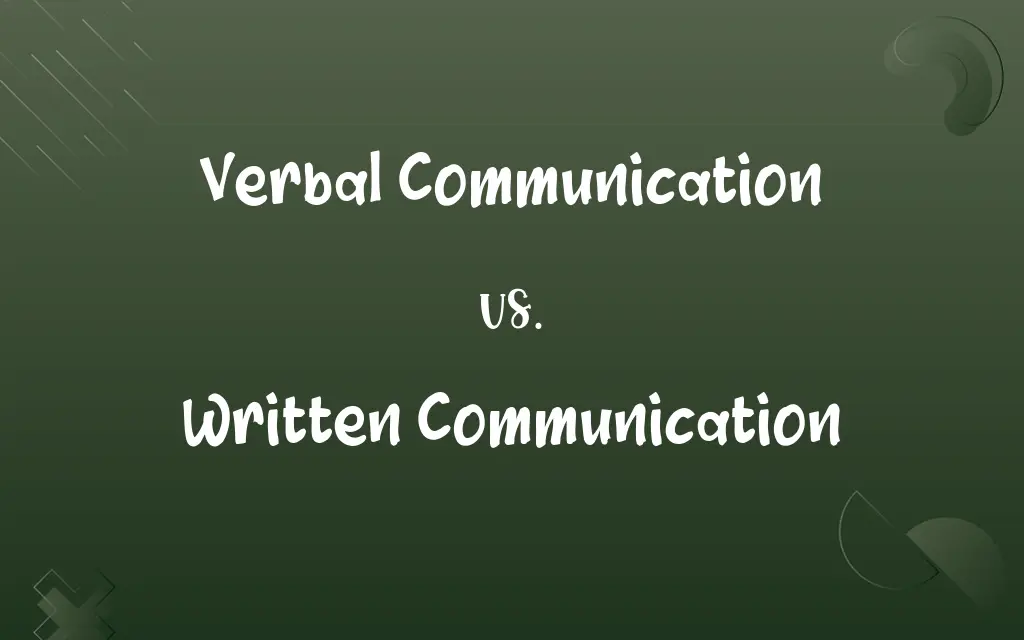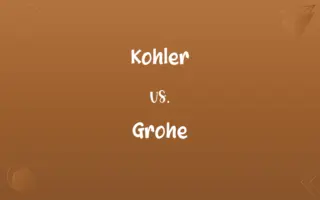Verbal Communication vs. Written Communication: Know the Difference

By Shumaila Saeed || Published on February 8, 2024
Verbal Communication involves spoken words, while Written Communication uses written words or symbols.

Key Differences
Verbal Communication involves the use of spoken words and can include face-to-face conversation, telephone calls, and other scenarios where speaking occurs. It's dynamic and immediate, allowing for instant feedback and adjustment of the message. Written Communication, on the other hand, involves expressing ideas in writing, such as letters, emails, and social media posts. It's more permanent and structured, often used for detailed explanations or record-keeping.
Shumaila Saeed
Feb 08, 2024
In Verbal Communication, tone, pitch, and volume of voice are crucial in conveying emotions and intent. This form of communication is often more effective in expressing feelings and ensuring understanding through immediate feedback. Written Communication relies on the choice of words, punctuation, and structure to convey tone and emotion. It requires clarity in language to prevent misunderstandings, as immediate feedback is not usually possible.
Shumaila Saeed
Feb 08, 2024
Non-verbal cues like facial expressions and body language play a significant role in Verbal Communication. They can reinforce or contradict what is being said, adding depth to the communication process. Written Communication, however, lacks these non-verbal cues. It often makes use of emoticons or specific language styles to imply tone and emotion, which can be open to interpretation.
Shumaila Saeed
Feb 08, 2024
Verbal Communication can be informal and spontaneous, making it ideal for personal interactions and immediate problem-solving. It allows for quick decision-making and brainstorming. Written Communication, however, is more formal and considered. It's preferred for official, legal, and professional contexts where records and detailed deliberation are necessary.
Shumaila Saeed
Feb 08, 2024
Verbal Communication is often more suitable for conveying complex, nuanced information or for persuasive purposes, as it allows for immediate clarification and adaptation to the listener's responses. Written Communication is more effective for delivering specific, unambiguous information or instructions, providing a reference that can be returned to and analyzed.
Shumaila Saeed
Feb 08, 2024
ADVERTISEMENT
Comparison Chart
Tone Expression
Through voice modulation
Through word choice and punctuation
Shumaila Saeed
Feb 08, 2024
Record Keeping
Difficult to keep a record unless recorded
Easy to document and reference
Shumaila Saeed
Feb 08, 2024
ADVERTISEMENT
Emotional Expression
Easier to convey emotions through tone and non-verbal cues
Relies on writing style to convey emotions
Shumaila Saeed
Feb 08, 2024
Complexity
Better for complex ideas needing immediate clarification
Suitable for detailed, precise communication
Shumaila Saeed
Feb 08, 2024
Context Use
Preferred in personal, immediate interactions
Used in official, legal, and professional contexts
Shumaila Saeed
Feb 08, 2024
Verbal Communication and Written Communication Definitions
Verbal Communication
Verbal Communication is the process of sharing ideas orally.
His Verbal Communication skills were evident during the presentation.
Shumaila Saeed
Jan 19, 2024
Written Communication
Written Communication refers to conveying messages in writing.
Her Written Communication in the report was detailed and informative.
Shumaila Saeed
Jan 19, 2024
ADVERTISEMENT
Verbal Communication
Verbal Communication is the exchange of information using spoken words.
During the meeting, the manager used Verbal Communication to clarify the project goals.
Shumaila Saeed
Jan 19, 2024
Written Communication
Written Communication means sharing information through written words or symbols.
The brochure was an excellent example of Written Communication, providing clear information.
Shumaila Saeed
Jan 19, 2024
Verbal Communication
Verbal Communication involves using voice to express thoughts.
Through Verbal Communication, she conveyed her enthusiasm for the project.
Shumaila Saeed
Jan 19, 2024
Written Communication
Written Communication is the expression of ideas in written form.
The email was an effective piece of Written Communication, outlining the new policy.
Shumaila Saeed
Jan 19, 2024
Verbal Communication
Verbal Communication refers to conveying messages through speaking.
In the interview, her Verbal Communication was clear and confident.
Shumaila Saeed
Jan 19, 2024
Written Communication
Written Communication is the process of documenting thoughts and information.
The contract was a legal form of Written Communication, binding both parties.
Shumaila Saeed
Jan 19, 2024
Verbal Communication
Verbal Communication means interacting with others using spoken language.
Their Verbal Communication in the debate was both articulate and persuasive.
Shumaila Saeed
Jan 19, 2024
Written Communication
Written Communication involves using text to communicate ideas.
His Written Communication on social media was engaging and thought-provoking.
Shumaila Saeed
Jan 19, 2024
Repeatedly Asked Queries
Which is better for quick feedback, Verbal or Written Communication?
Verbal Communication usually provides quicker feedback.
Shumaila Saeed
Feb 08, 2024
Can Written Communication be misunderstood more easily than Verbal?
Yes, without non-verbal cues, Written Communication can be more prone to misinterpretation.
Shumaila Saeed
Feb 08, 2024
Is Written Communication more formal than Verbal?
Typically, yes. Written Communication tends to be more structured and formal.
Shumaila Saeed
Feb 08, 2024
What is the primary difference between Verbal and Written Communication?
Verbal Communication uses spoken words, while Written Communication uses written words or symbols.
Shumaila Saeed
Feb 08, 2024
Is Written Communication more suitable for complex legal documents?
Yes, its formality and permanence make it suitable for legal contexts.
Shumaila Saeed
Feb 08, 2024
Can emotional expression be easier in Verbal Communication?
Generally, yes, due to the use of voice tone and body language.
Shumaila Saeed
Feb 08, 2024
Can Verbal Communication be more spontaneous than Written?
Yes, it often allows for more immediate and impromptu interaction.
Shumaila Saeed
Feb 08, 2024
Can Verbal Communication include non-verbal elements?
Yes, non-verbal cues like body language and facial expressions are important in Verbal Communication.
Shumaila Saeed
Feb 08, 2024
Do Verbal and Written Communication require different skills?
Yes, each form requires specific skills related to speaking or writing effectively.
Shumaila Saeed
Feb 08, 2024
Does Verbal Communication require vocal clarity and modulation?
Yes, these are important for effective delivery and understanding.
Shumaila Saeed
Feb 08, 2024
Can Verbal Communication be less effective in large groups?
It can be, especially if not everyone is able to hear or interact directly.
Shumaila Saeed
Feb 08, 2024
Is proofreading important in Written Communication?
Absolutely, to ensure clarity and prevent misunderstandings.
Shumaila Saeed
Feb 08, 2024
Does Written Communication allow more time for response?
Yes, it generally provides more time to think and formulate responses.
Shumaila Saeed
Feb 08, 2024
Is Written Communication better for record-keeping?
Yes, as it provides a physical or digital record.
Shumaila Saeed
Feb 08, 2024
Can Verbal Communication be more persuasive than Written?
Often, yes, because of the ability to use tone and adapt to feedback.
Shumaila Saeed
Feb 08, 2024
Can Written Communication be more accessible for reference later?
Yes, its documented nature makes it easier to reference.
Shumaila Saeed
Feb 08, 2024
Is Verbal Communication more effective for emotional support?
Often, as it allows for empathy and emotional connection through voice and expression.
Shumaila Saeed
Feb 08, 2024
Is Written Communication evolving with digital technology?
Yes, digital platforms have significantly influenced the style and usage of Written Communication.
Shumaila Saeed
Feb 08, 2024
Is listening a critical skill in Verbal Communication?
Definitely, effective listening is key to successful Verbal Communication.
Shumaila Saeed
Feb 08, 2024
Can Written Communication be less effective in urgent situations?
It can be, as it might not provide the immediacy that Verbal Communication does.
Shumaila Saeed
Feb 08, 2024
Share this page
Link for your blog / website
HTML
Link to share via messenger
About Author
Written by
Shumaila SaeedShumaila Saeed, an expert content creator with 6 years of experience, specializes in distilling complex topics into easily digestible comparisons, shining a light on the nuances that both inform and educate readers with clarity and accuracy.









































































